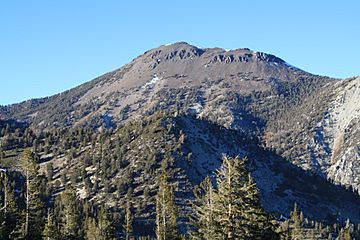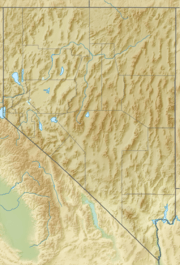Mount Rose (Nevada) facts for kids
Quick facts for kids Mount Rose |
|
|---|---|

Mt. Rose looking North from SR431, December 2008
|
|
| Highest point | |
| Elevation | 10,785 ft (3,287 m) NAVD 88 |
| Prominence | 3,630 ft (1,106 m) |
| Listing |
|
| Geography | |
| Location | Washoe County, Nevada, U.S. |
| Parent range | Carson Range |
| Topo map | USGS Mount Rose |
| Climbing | |
| Easiest route | Mount Rose Trail from Mount Rose Summit on Nevada State Route 431 |
Mount Rose is the tallest mountain in Washoe County, Nevada, United States. It is part of the Carson Range. This mountain is very important because it stands out a lot from the land around it. It is the highest and most noticeable peak in the Sierra Nevada range within Nevada. Mount Rose is located in the Mount Rose Wilderness, which is a protected area within the Humboldt-Toiyabe National Forest.
Mount Rose used to be a volcano, but it is now extinct, meaning it will not erupt again. The mountain sits between Lake Tahoe and Reno. A road called State Route 431 goes near Mount Rose Summit, which is southeast of the mountain. Because Mount Rose is so high up, most of the rain that falls on it turns into snow. If you look east from Mount Rose, you can see the Truckee Meadows area. This is the second largest place where people live in Nevada.
People have different ideas about how Mount Rose got its name. One story says it was named after Jacob S. Rose, who was an early settler in the area. Another story suggests it was named after Rose Hickman, an early explorer.
Contents
Mount Rose Ski Tahoe Resort
Mount Rose Ski Tahoe is a popular place for skiing and snowboarding. Even though it has "Mount Rose" in its name, the ski resort is not actually on Mount Rose itself. It is located on the slopes of Slide Mountain. Slide Mountain is on the other side of Nevada State Route 431. The eastern side of Slide Mountain is known as the East Bowl of Mt. Rose.
In 1964, the northern part of Slide Mountain was named Mount Rose Ski Area. At the same time, another ski area called Reno Ski Bowl was renamed Slide Mountain Ski Area. Then, in 1987, these two ski areas joined together. They started operating as one big resort called Mt. Rose.
Mount Rose Weather Observatory
Dr. James Edward Church was a professor at the University of Nevada. He started the Mount Rose Weather Observatory on June 29, 1905. This was one of the first weather stations in America built high up in the mountains. It helped scientists learn more about weather at high altitudes.
Summit Views
When you reach the top of Mount Rose, you can see amazing views all around. The image above shows a full 360-degree view from the summit. You can see for many miles in every direction.
Climate and Weather
Mount Rose is a very tall mountain, reaching over 3,000 meters (about 10,000 feet). Because it is so high and far north, it has an alpine climate. This means it has cold, snowy winters and cool summers. It also has some features of a humid continental climate.
The summit usually has four months of warmer weather, from June to September. The rest of the year is cold, with temperatures often below freezing. Unlike most of Nevada, which is very dry, Mount Rose gets a lot of rain and snow. This makes it stand out from the state's mostly hot and dry desert climate.
| Climate data for Mount Rose, Nevada (station elevation 7,500ft) | |||||||||||||
|---|---|---|---|---|---|---|---|---|---|---|---|---|---|
| Month | Jan | Feb | Mar | Apr | May | Jun | Jul | Aug | Sep | Oct | Nov | Dec | Year |
| Record high °F (°C) | 55 (13) |
58 (14) |
67 (19) |
68 (20) |
79 (26) |
82 (28) |
89 (32) |
88 (31) |
83 (28) |
77 (25) |
65 (18) |
58 (14) |
89 (32) |
| Mean daily maximum °F (°C) | 37.0 (2.8) |
36.9 (2.7) |
36.9 (2.7) |
42.0 (5.6) |
55.6 (13.1) |
66.8 (19.3) |
75.0 (23.9) |
75.5 (24.2) |
67.0 (19.4) |
54.2 (12.3) |
43.0 (6.1) |
39.5 (4.2) |
52.5 (11.4) |
| Mean daily minimum °F (°C) | 18.6 (−7.4) |
17.8 (−7.9) |
19.5 (−6.9) |
23.2 (−4.9) |
33.2 (0.7) |
41.0 (5.0) |
46.4 (8.0) |
47.6 (8.7) |
40.7 (4.8) |
32.1 (0.1) |
23.8 (−4.6) |
21.7 (−5.7) |
30.5 (−0.8) |
| Record low °F (°C) | −10 (−23) |
−2 (−19) |
−5 (−21) |
4 (−16) |
13 (−11) |
20 (−7) |
27 (−3) |
31 (−1) |
21 (−6) |
14 (−10) |
1 (−17) |
−5 (−21) |
−10 (−23) |
| Average precipitation inches (mm) | 5.51 (140) |
4.90 (124) |
5.07 (129) |
2.11 (54) |
0.91 (23) |
0.55 (14) |
0.56 (14) |
0.91 (23) |
1.28 (33) |
1.67 (42) |
3.10 (79) |
4.03 (102) |
30.60 (777) |
| Average snowfall inches (cm) | 16.8 (43) |
37.1 (94) |
43.0 (109) |
4.7 (12) |
0 (0) |
0.4 (1.0) |
0 (0) |
0 (0) |
0.1 (0.25) |
2.3 (5.8) |
2.3 (5.8) |
9.9 (25) |
116.6 (296) |
| Source: The Western Regional Climate Center | |||||||||||||
See also
 In Spanish: Monte Rose (Nevada) para niños
In Spanish: Monte Rose (Nevada) para niños
 | Aaron Henry |
 | T. R. M. Howard |
 | Jesse Jackson |



